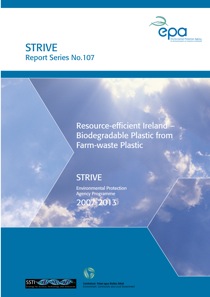Resource-efficient Ireland – Biodegradable Plastic from Farm-waste Plastic
Summary: This project looks at upcycling waste plastic from Irish farms to a more valuable biodegradable form of plastic.

This project looks at upcycling waste plastic from Irish farms to a more valuable biodegradable form of plastic.
There is also a 2 page summary available highlighting the achievements of this project.
The EPA funded a research consortium led by University College Dublin (UCD) researchers to investigate novel methods for tackling the problem of waste plastic, which is predominantly polyethylene (PE), from the agricultural sector in a sustainable
manner that could support the green economy.
The result of this work is summarised in the following report, which describes the interdisciplinary approach used for converting post-consumer waste (PE) into value-added biodegradable material.
Process chemistry, microbiology, bioprocesses engineering, chemical engineering, material science and nanotechnology were combined to convert PE to the biodegradable polymer polyhydroxyalkanoate (PHA). PE is used widely in many sectors of society including agriculture (in the form of films for applications such as silage wrapping, poly-tunnels and plastic mulch) and makes up the largest proportion of worldwide waste plastic. Farm-plastic waste, made of PE, was subjected to a two-step treatment to produce a biodegradable plastic. The researchers further improved their process through chemical and biological investigations and developed applications for the biodegradable polymer produced. The properties of the biodegradable plastic
were then improved through the use of nanotechnology.
The project results are now being exploited by a UCD spin-out company Bioplastech operating in the green technology space. Thus, job creation, new recycling technologies and environmentally friendly products are arising from research funding to build the waste plastic to biodegradable plastic technology at a larger scale in Ireland and internationally.
https://www.epa.ie/media/archive/research/research-thumbnails/STRIVE_107_thumb.jpg